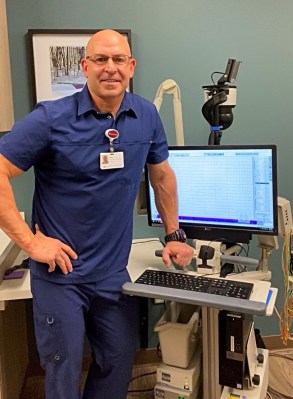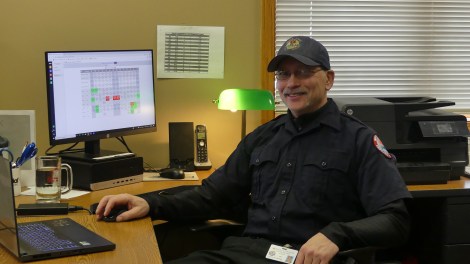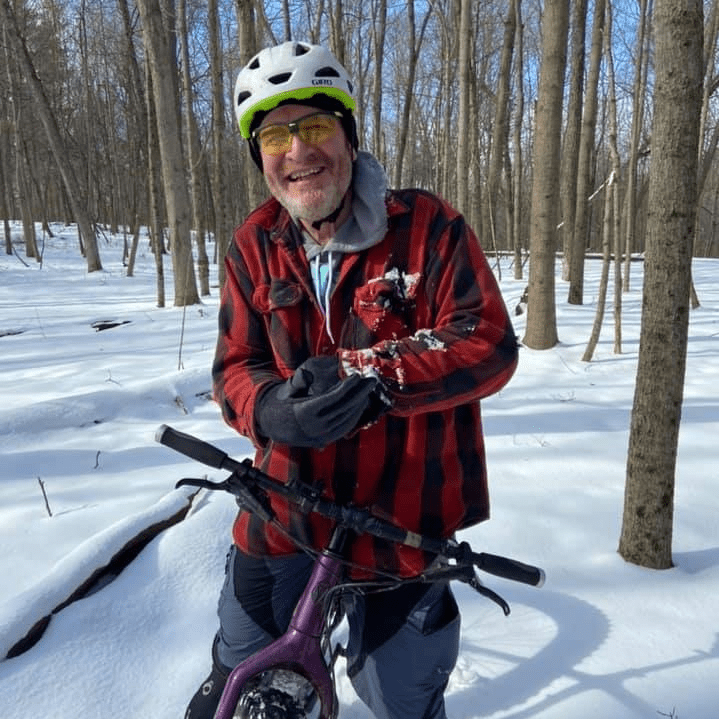ArmenKassouni, 61, isn’t in the habit of using Facebook messenger to communicate with people he has never formally met, but in this case, he has made an exception.
His message to the two men he contacted was this: “I’m back on my bike, thanks to you guys.”
That’s because on October 30, 2021, after riding his mountain bike on the trails at Mosquito Creek near Muskegon, Kassouni suffered a heart attack. These two strangers were among the first to save his life.
“My friends and I had just finished a 25-mile trail ride and were in the parking lot. Apparently, I fell on the ground and threw up, but I have no memory of it. Thankfully, [my friends] rolled me over and cleared my passageway.”
Two other men happened to also be in the parking lot: Mark Tourcotte, a Mercy Health Muskegon registered EEG (electro encephalographic) technologist, and Steven Schrader, an EMT for White Lake Ambulance Authority and Lieutenant with Blue Lake Township Fire Department. Ironically, neither cyclist was planning to be there at that time.
Right Place, Right Time
Tourcotte had the day off so he could attend his son’s soccer game, but his son was ill. Instead of going to the game, Tourcotte decided to ride his mountain bike on the nearby trails. Typically, this avid cyclist loves to hit the jumps on the trails…repeatedly.

“Something that day told me not to do it. Instead, I should ride as fast as I can and work on my time, and I never do that. For some reason I listened to the voice in my head,” said Tourcotte. When his ride ended at the parking lot, he noticed that several people were on the ground.
Tourcotte went to see what was happening and felt for Kassouni’s pulse but “there was nothing there. I started CPR immediately.” Again, circumstances aligned for this medical professional to be prepared for that moment.
“At work we renew our CPR cards every two years. In addition to this, we are now required to do interactive modules every three months. This involves different CPR scenarios, as well as additional manikin training to further maintain and perfect skills. I literally had just completed my most recent module, so everything was fresh in my mind. I didn’t have to think. I just knew what to do.”
“After a few minutes, another gentleman approached to offer help. He introduced himself as an off-duty EMT, and we traded off doing chest compressions until the paramedics arrived. They shocked Kassouni into a sinus rhythm immediately.”

Schrader was fitting in a ride that day between fixing his brakes and reporting for a shift later. He arrived for his mountain bike ride later than he had hoped. While unloading his bike, he noticed a man in the parking lot walking back and forth with his cell phone looking concerned. Then when he began his ride, he saw someone on the ground and rode over to help.
“Mark and I took turns with CPR and keeping Armen’s airway open. Because of my background as a firefighter and EMT, I have seen this scenario play out many times. Time is critical and as we provided continuous chest compressions, we were also able to get the patient ready for the AED (automated external defibrillator) by getting his shirt off. We maintained compressions as the paramedics applied the AED and even as the AED charged,” Schrader recalled. That saved valuable time.
Kassouni’s Recollection
Although unconscious at the time, Kassouni continued the story based on what others told him.
“The two strangers knew immediately what was up. While my friends called 9-1-1, these two men began CPR on me. When the ambulance arrived, the team used defibrillation on me. I understand they did it again during the ride to the emergency room at Mercy Health in Muskegon.”
Kassouni’s recollections after that are disjointed. He remembers first “meeting” Cardiologist Scott Harris, DO, in the Intensive Care Unit (ICU) — after he, too, saved Kassouni’s life.
“I had a ‘widow maker’ heart attack and survived it. Dr. Harris placed a stent in one of my arteries, which was 95 percent blocked.”
As a person who regularly exercises, gets annual checkups, and was not on any medications for heart issues, Kassouni did not expect to have a heart attack. His older brother had serious heart issues, so to be cautious, Kassouni had a CT scan checking for plaque buildup in his arteries earlier that year. The scan showed no buildup.
Nonetheless, Dr. Harris concluded that soft plaque, which was undetected by the CT scan, had caused his patient’s heart attack.
Thanks to the quick actions of everyone involved, Kassouni says, “Dr. Harris said my heart bounced back amazingly well to the point that it was difficult to tell I even had a heart attack.”
Quality Care
Kassouni does remember his time in the ICU. “I love those people. Everyone at Mercy Health was very accommodating. I had eight broken ribs from the CPR, and I was coughing a lot and making a lot of noise. Everyone was extremely nice to me. Even with COVID going on, the staff who came in and out during the different shifts were polite and helpful. I can’t say anything but good things about the entire staff. “
Following his procedure, Kassouni was referred to cardiac rehabilitation at Mercy Health Saint Mary’s in Grand Rapids, which is closer to his work and home. “I go there three times a week, and they work you out for an hour. The care I got at Mercy Health was second-to-none.”
A Message for All Readers
Kassouni, Tourcotte, and Schrader cannot stress enough the importance of everyday people learning CPR.
“Don’t hesitate. Get trained immediately. It’s not hard. Your actions could save someone’s life,” said Tourcotte. “And keep your skills up.”
Schrader agrees. “There won’t always be another person in a crisis to do CPR. Take advantage of any community training you can get.”
As a member of the West Michigan Mountain Bike Alliance, Kassouni and others are now planning a CPR class for all of the members. That’s one way he is trying to increase awareness of CPR training.
Back on his bike since December, Kassouni also has this message for others: “Dr. Harris indicated that one of the reasons I survived is that I exercise. I would send everyone a message that you need to exercise.”
Sound advice from a true survivor!
To learn more about our Heart services please visit, Heart | Mercy Health




